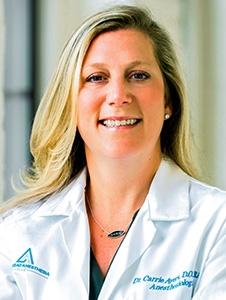Carrie Decato Ayers ’99
“I saw my time [at Middlebury] as the ultimate reward freedom can give a person. We were taught to think for ourselves, be free to learn, adventure, and be creative in a safe and comfortable environment. These freedoms, in my opinion, were worth protecting.”

Why did you decide to pursue national service and the military?
My father served in the New Hampshire Army National Guard for 28 years and he always instilled in us love of country and service to country. I always knew I would serve because I admired his service.
How did your Middlebury liberal arts education factor into the approach you took to your military service?
Middlebury was a wonderful preamble for service. I saw my time there as the ultimate reward freedom can give a person. We were taught to think for ourselves, be free to learn, adventure, and be creative in a safe and comfortable environment. These freedoms, in my opinion, were worth protecting.
Middlebury has an ethic of service to a community. What do you want to tell others about serving your community or your country through military service?
There is no greater honor than to serve your country other than to serve your God. The United States of America provides us freedom to live, freedom to think, and freedom to exist in any capacity we choose. Those brave enough to serve and fight for these freedoms should be proud and honored. I was truly blessed to be educated by the U.S. Army and to be able to serve side-by-side with some of the most intelligent, selfless, and hard-working people in the nation.
How did your experiences at Middlebury and with military service factor into upcoming opportunities or pursuits?
I am a board-certified anesthesiologist and I now practice as a civilian in my community currently. I trained in the Army and served 14 years on active duty. I owe not only the Army instruction but every patient I had both in combat and stateside for helping me to become the physician I am today. I work hard every day in my civilian practice to maintain my core values and leadership the Army taught me.
What advice would you give to others who may be considering military service?
Go into the military for the right reasons. Don’t take a scholarship or a sign-on bonus as a means of financial gain, but rather join with an open heart and attitude. If you open yourself up to the education and the experience, you will gain far more than money.
Is there anything else you would like to share about your experience as a service member or veteran at Middlebury?
When I was serving in Baghdad, I had a young soldier come to the aid station prior to a mission. He begged me to let him miss the mission because he had a sprained finger. I was stern and denied his request. He was insistent he wasn’t fit for the mission. His finger was fine. I sent him out. Within five minutes of leaving the FOB the vehicle he was in hit an IED and he was brought back to me at the aid station deceased. It was one of the most devastating losses I’ve ever had in medicine. I see and have a lot of death as an anesthesiologist, but his death really got to me. I wasn’t my best. I wasn’t the best to him. I wasn’t as caring or compassionate as I could have been. I think to myself as a mother now that I wouldn’t have wanted his last words to have been unkind or uncaring. When he came back to me and I declared him deceased, I apologized, and I promised to always be better. And I am. I am better EVERY SINGLE DAY AND EVERY SINGLE PATIENT. I learned a lot that day. I work very hard for every patient, every procedure, to let them know that no matter how small the issue that it is the biggest issue to me and for us as a patient/doctor to face together. I truly try to engage each person with compassion and respect so that no matter what the outcome may be that they know they are valued.

